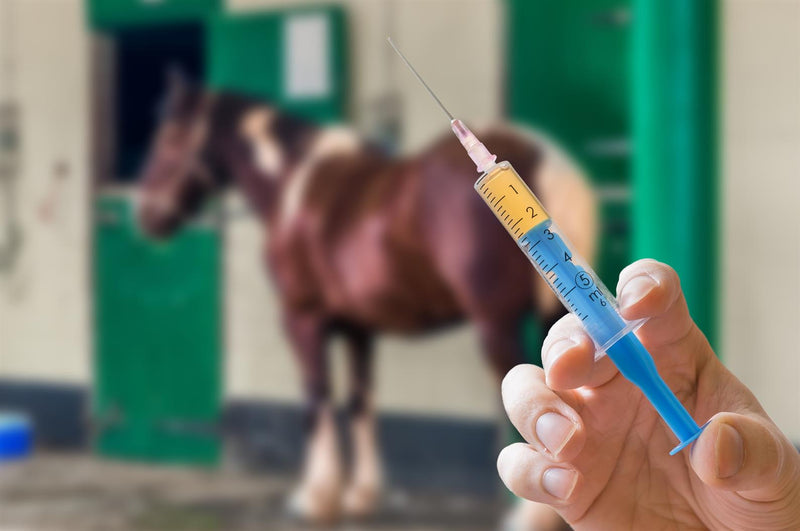Published: June 2020 | Updated: April 2024
What Vaccines Do Horses Need?
As responsible horse owners, you know that vaccinations are a non-negotiable part of your horse’s care.
But you might have some questions about the actual vaccination protocol: which ones, when, and how can you minimize negative reactions?
When thinking about recommended horse vaccines, it is vitally important to talk to your veterinarian. Take the time to have a conversation in which you consider your horse’s risk of contracting a particular disease, vaccine efficacy, and potential adverse reactions.
The particular vaccinations that you and your vet decide your horse will receive will likely vary based on where you live, other environmental factors, exposure risk (travel, shows, etc.), age, and use of the horse. For example, foals have different vaccination needs than an adult maintenance horse, and a horse living on the East Coast may have different needs than a horse on the West Coast.
Core Vaccines For Horses
While taking an individualized approach to your horse’s health, keep in mind that the American Association of Equine Practitioner’s vaccination guidelines includes 5 core vaccines for horses.
These equine core vaccines should not be missed, regardless of where you live or what you do with your horse. The following diseases can be contracted by any horse in just about any environment, regardless of age, discipline, or proximity to other horses.
- Eastern Equine Encephalomyelitis (EEE)
- Western Equine Encephalomyelitis (WEE)
- Rabies
- Tetanus
- West Nile Virus (WNV)
You can find more detailed information about each of these vaccines here.
When to Vaccinate Horses
Again, make sure you talk to your veterinarian and create a comprehensive plan for your horse’s health. In general, horses receive the equine rabies vaccine, Western and Eastern Equine Encephalitis Virus vaccine, Tetanus vaccine, and West Nile Virus vaccine annually in the spring.
Since many of these diseases (EEE, WEE, WNV) are spread by mosquitoes, it is important to make sure your horse is protected before the hot summer months when bugs are rampant.
You’re most likely familiar with the Equine Influenza (“flu”) and Rhinopneumonitis (“Rhino”) vaccine for EHV-1 and EHV-4, which is highly recommended for most horses, especially those traveling or in contact with other horses who are traveling. Horses usually receive this vaccination twice a year in the spring and fall.
What’s the 5 Way Horse Vaccine?
You’ve surely heard about the 4-way, 5-way, or even 6-way horse vaccines, and it is easy to get confused! The main benefit of this type of vaccination is that your horse receives only one poke for multiple vaccines.
There are many different types of multivalent vaccines; Each manufacturer has different combinations, so you should consult your veterinarian to determine the most appropriate combo for your horse.
Vaccines administered by veterinarians will also accompany the manufacturer’s guarantee which may be useful in case of abnormal vaccine reaction or vaccine failure.
Probiotics and Vaccines
If you are here, you likely already know that probiotics play a huge role in immune system function.
Science has been researching the link between probiotics and their effect on vaccine reaction for some time, but we’re excited to report that recent research has looked at our good friend, Saccharomyces boulardii, and its relationship to vaccinations,
Researchers in Brazil were curious to see if S. boulardii would have any impact on vaccine efficacy in sheep. They discovered that sheep who were supplemented with S. boulardii had a more efficient and improved immune response after receiving multiple vaccinations.
While this study was conducted using sheep, which receive different vaccinations than horses, it does suggest that S. boulardii can improve the effectiveness of vaccines.
There is surely more research headed in this direction. For now, establish your equine vaccination schedule and focus on supporting your horse’s immune system and overall wellbeing through the use of high-quality equine probiotics.
Read More:
Probiotics Saccharomyces boulardii Improve the Vaccine Immune Response in Sheep


